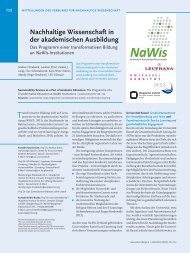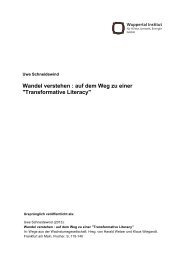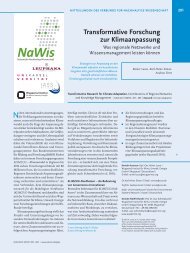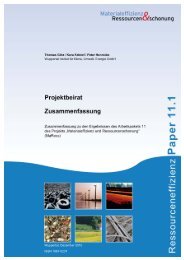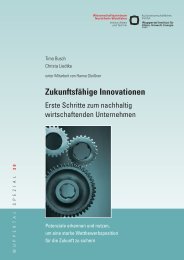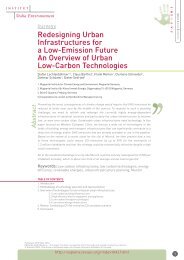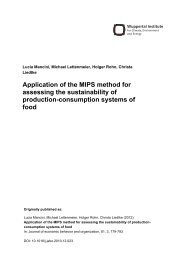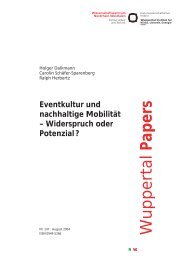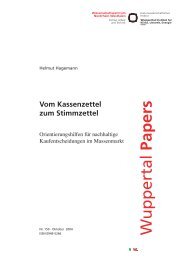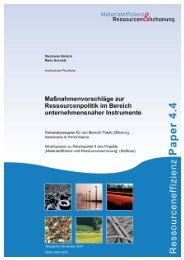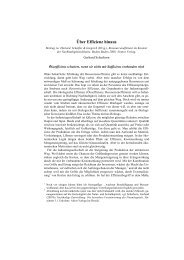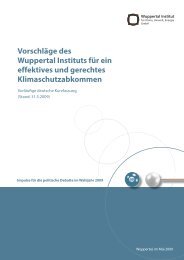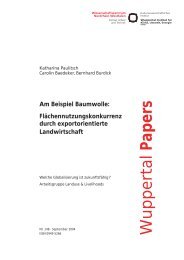Resource Efficiency Atlas - Publication Server of the Wuppertal ...
Resource Efficiency Atlas - Publication Server of the Wuppertal ...
Resource Efficiency Atlas - Publication Server of the Wuppertal ...
You also want an ePaper? Increase the reach of your titles
YUMPU automatically turns print PDFs into web optimized ePapers that Google loves.
1.2 The project <strong>Resource</strong> <strong>Efficiency</strong> <strong>Atlas</strong><br />
<strong>Resource</strong> efficiency is a topic that is being discussed more<br />
and more intensively in Germany in recent years. A range<br />
<strong>of</strong> federal and state funding activities as well as societal<br />
initiatives have emerged, motivated by rising energy- and<br />
resource prices, scarcity <strong>of</strong> resources and <strong>the</strong> increasing im-<br />
portance <strong>of</strong> sustainable economic activity within <strong>the</strong> con-<br />
text <strong>of</strong> global warming. The awareness <strong>of</strong> new technologi-<br />
cal solutions contributing to increased resource efficiency<br />
levels is widely supported by past and current studies (e.g.<br />
in <strong>the</strong> “MaRess” project, Rohn et al. 2010). However, a strate-<br />
gic perspective on resource efficiency within technological<br />
developments can rarely be observed in Germany. In con-<br />
trast <strong>the</strong>re is a strong international trend towards introduc-<br />
ing resource efficiency as a strategic topic for technological<br />
development: For instance, in <strong>the</strong> Technology Platforms <strong>of</strong><br />
<strong>the</strong> European Union, <strong>the</strong> Cleaner Production Centres and in<br />
countries such as Japan and <strong>the</strong> USA – very <strong>of</strong>ten under <strong>the</strong><br />
heading “Green Tech” or “Clean Technologies”.<br />
In this context, <strong>the</strong> primary aim <strong>of</strong> <strong>the</strong> project <strong>Resource</strong> <strong>Efficiency</strong><br />
<strong>Atlas</strong> was to identify and evaluate products and<br />
technologies with high resource efficiency potential (leading<br />
products and technologies) on a global level. Specific<br />
implementation examples for general principles have been<br />
investigated and prepared. The analysis was focused on a<br />
European context. Additionally, countries with assumed<br />
technological advantages in selected areas such as Japan<br />
and <strong>the</strong> USA have been covered. The developments <strong>of</strong> lowtech<br />
solutions as well as solutions, which are processed in<br />
developing countries, were not explicitly included in <strong>the</strong><br />
research. However, this does not preclude that some <strong>of</strong> <strong>the</strong><br />
identified solutions are relevant for developing countries.<br />
Ano<strong>the</strong>r task <strong>of</strong> <strong>the</strong> project was to assess <strong>the</strong> potential<br />
contribution <strong>of</strong> identified products and technologies to innovation<br />
policy action fields for sustainable development.<br />
In addition to that, courses <strong>of</strong> action for a better implementation<br />
<strong>of</strong> <strong>the</strong> identified technologies have been developed<br />
within <strong>the</strong> German national context. Afterwards, <strong>the</strong> generated<br />
results have been discussed and validated with experts<br />
and stakeholders in a workshop.<br />
The project started with an analysis (desk research) <strong>of</strong> existing<br />
publications, studies, technology platforms, strategies<br />
as well as fur<strong>the</strong>r materials focusing on resource efficiency<br />
and innovative technologies. Thereby, aside from<br />
searching for relevant technologies and products, relevant<br />
international renowned experts were identified. During<br />
<strong>the</strong> selection process <strong>of</strong> <strong>the</strong> experts, emphasis was placed<br />
on a wide range <strong>of</strong> all areas such as application, research<br />
and development, and politics as well as selected industry<br />
sectors and topics. In interviews, 17 experts (see appendix)<br />
were questioned about issues related to, for example,<br />
opportunities and risks <strong>of</strong> <strong>the</strong> implementation <strong>of</strong> resource<br />
efficiency. Fur<strong>the</strong>rmore, it was necessary to identify resource<br />
efficiency enhancing products and technologies<br />
within selected industry sectors and topics as well as <strong>the</strong>ir<br />
potentials.<br />
The main target group <strong>of</strong> <strong>the</strong> survey were <strong>the</strong> Cleaner<br />
Production Centres operating in 43 countries worldwide as<br />
well as comparable institutions abroad. The integrated and<br />
comparative evaluation <strong>of</strong> <strong>the</strong> results provided strategic<br />
approaches for <strong>the</strong> implementation <strong>of</strong> identified resource<br />
efficient technologies and resource efficient products in<br />
Germany as a contribution for sustainable development.<br />
A workshop with stakeholders and resource efficiency experts<br />
from science, politics, and associations was organized<br />
in order to discuss <strong>the</strong> results <strong>of</strong> <strong>the</strong> first phase <strong>of</strong> <strong>the</strong><br />
project and <strong>the</strong>ir options <strong>of</strong> utilization. The results <strong>of</strong> <strong>the</strong><br />
workshop were incorporated into <strong>the</strong> final version <strong>of</strong> <strong>the</strong><br />
examples and <strong>the</strong> <strong>Resource</strong> <strong>Efficiency</strong> <strong>Atlas</strong>.<br />
A general aim <strong>of</strong> all activities within <strong>the</strong> project was a<br />
broad dissemination <strong>of</strong> results; this should be continued<br />
beyond <strong>the</strong> project’s scope. For this purpose, a project<br />
website, which is available in both German and English<br />
(www.ressourceneffizienzatlas.de) was created, where fur<strong>the</strong>r<br />
best practice examples are described apart from <strong>the</strong><br />
existing print version. Moreover, <strong>the</strong> distribution <strong>of</strong> results<br />
took place in workshops, presentations, special events,<br />
publication <strong>of</strong> results in specialized, corresponding committees<br />
and networks (e.g. Eco-innovation Observatory,<br />
Factor X network, <strong>Resource</strong> efficient network).<br />
Ressourceneffizienzatlas<br />
<strong>Resource</strong> <strong>Efficiency</strong> <strong>Atlas</strong> 9



